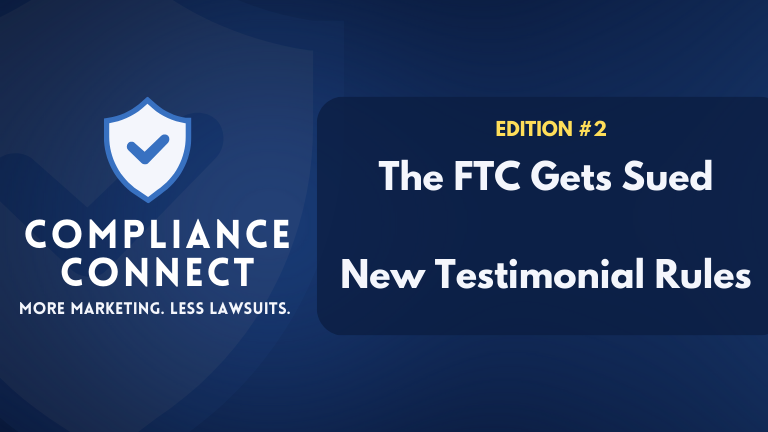Good morning! This is the second edition of the Compliant Connect newsletter.
The goal is simple: to keep you in the loop on what the FTC and other regulatory agencies are up to so that you can protect yourself.
These newsletters will land in your inbox twice a week – Mondays and Thursdays.
Remember: this is NOT legal advice, only information!
Here’s the rundown today…
- ⚖️ FTC Sued By Former Target
- 🔍 MLMs Called Out By The FTC
- 🕵️♂️ What FTC Investigations Look Like
- ⭐ New Testimonial And Review Rules
- ❗ Little Known Montana Law Could Get You In Trouble
- ✅ How To Make Recurring Programs Compliant
Compliance Digest: What You Should Read Today
The FTC Lost A Case, And Now It’s Getting Sued
Back in 2020, The FTC accused American Future Systems of duping customers into buying print subscriptions. The case was thrown out by a judge in March of this year.
Now that company is suing the FTC, trying to claw back $5.4 million in legal fees from the multi-year legal battle.
This is unusual, since the FTC rarely loses when it takes a company it’s investigating to court. It’s even rarer for the FTC itself to pay up!
FTC Puts MLMs Under The Microscope
The FTC reviewed the income disclosures from 70 multi-level marketing companies. They didn’t like what they saw.
Many of these statements emphasize high earnings of a few while hiding the limited or nonexistent income of most participants. The findings raise concerns about transparency and honesty in MLM income claims.
For non-MLM companies, this release is important because it’s a reminder that the FTC is emphasizing earnings claims. Specifically, they’re pay attention to the TYPICALITY of the claims you make.
Unfortunately, most companies don’t know what result their typical customer gets…
What Happens During An FTC Investigation (Explainer)
This is a great article about how the FTC is ramping up its enforcement, and what businesses can expect if they’re ever in the FTC’s crosshairs.
It does a great job of breaking down Civil Investigative Demands (CIDs) – a common way the FTC investigates companies. It explains how they work and how you should respond if you’re ever subjected to one.
Hopefully with the help of this newsletter and other resources, you are never put in that position!

New FTC Rules On Fake Reviews & Testimonials – What YOU Need To Know
On August 14, the FTC announced new rules to CRACK DOWN on fake reviews and testimonials.
Until now, the FTC has gone after companies engaging in these practices on a case by case basis.
With these new rules, they want to make it even EASIER to go after companies who engage in these practices.
They also want to get ahead of the rise in AI-generated fake reviews.
If you are a business owner or marketer, it’s ESSENTIAL to know what these new rules are.
Here’s a breakdown of the key practices that are PROHIBITED…
#1 – Fake or False Consumer Reviews
You can’t create, sell, buy, or spread fake reviews or testimonials, including AI-generated ones, or those that misrepresent someone’s experience with a business or its products.
#2 – Buying Positive or Negative Reviews
You can’t provide compensation or incentives in exchange for consumer reviews that express a particular positive or negative sentiment.
#3 – Insider Reviews and Consumer Testimonials
Company insiders, like officers or managers, can’t provide reviews or testimonials without clearly disclosing their connection to the business. You also can’t get immediate relatives to leave reviews without proper disclosure.
#4 – Company-Controlled Review Websites
You can’t pretend that a website you control offers independent reviews or opinions about your products or services.
#5 – Review Suppression
You can’t suppress negative reviews through unfounded legal threats, intimidation, or misrepresentations about the completeness of reviews on your website.
#6 – Fake Social Media Indicators
You can’t purchase fake social media indicators, like followers or views, to make your brand look more popular than it actually is. This is limited to situations where “the buyer knew or should have known that the indicators were fake and misrepresent the buyer’s influence or importance for a commercial purpose.”
This rule goes live 60 days after its publication in the Federal Register.
Did You Know…
In Montana, telemarketers have to be registered, or they’ll face fines and even imprisonment.

If You Have A Continuity Program, This Is The Law You Need To Know About…
One of the FTC’s favorite targets are non-compliant continuity programs. This is because MANY continuity programs are not compliant, and the FTC has a specific law to work from.
The law is the “Restore Online Shoppers Confidence Act” (ROSCA).
If you’re involved in selling subscriptions, memberships or other recurring services online, you need to know what’s in this law.
ROSCA was passed in 2010, and it’s intended to protect consumers from some common subscription practices like…
- Pre-ticked boxes to join a continuity program
- Burying the terms of the subscription deep in the website or in tiny fonts
- Sneaky extra charges that pop up just as someone is about to click “buy”
Those practices are all ILLEGAL thanks to ROSCA. Yet marketers still do them…
How To Be Compliant With ROSCA.
If you’re reading this, then you want to be compliant. It’s actually NOT that hard.
You CAN sell a continuity program. Just make sure you get clear, informed consent before charging new subscribers.
If you’re going to keep charging subscribers month after month unless they proactively cancel (called a “negative option”), make sure they are aware of that up front.
Make sure customers know how to cancel their subscription. Make sure it’s EASY to do.
You can have a “free” trial, just make sure you disclose how long that trial lasts, what they’ll be billed if they don’t cancel, and how they can cancel.
In short, you have to be transparent and upfront about your continuity program.
If your customers look at their bank accounts and are SURPRISED by the charges they’re getting, then you probably aren’t compliant.
The good news is that you can implement all of these practices and still get strong conversions. More important, you’ll have customers who aren’t filing complaints that’ll get the FTC’s attention.
